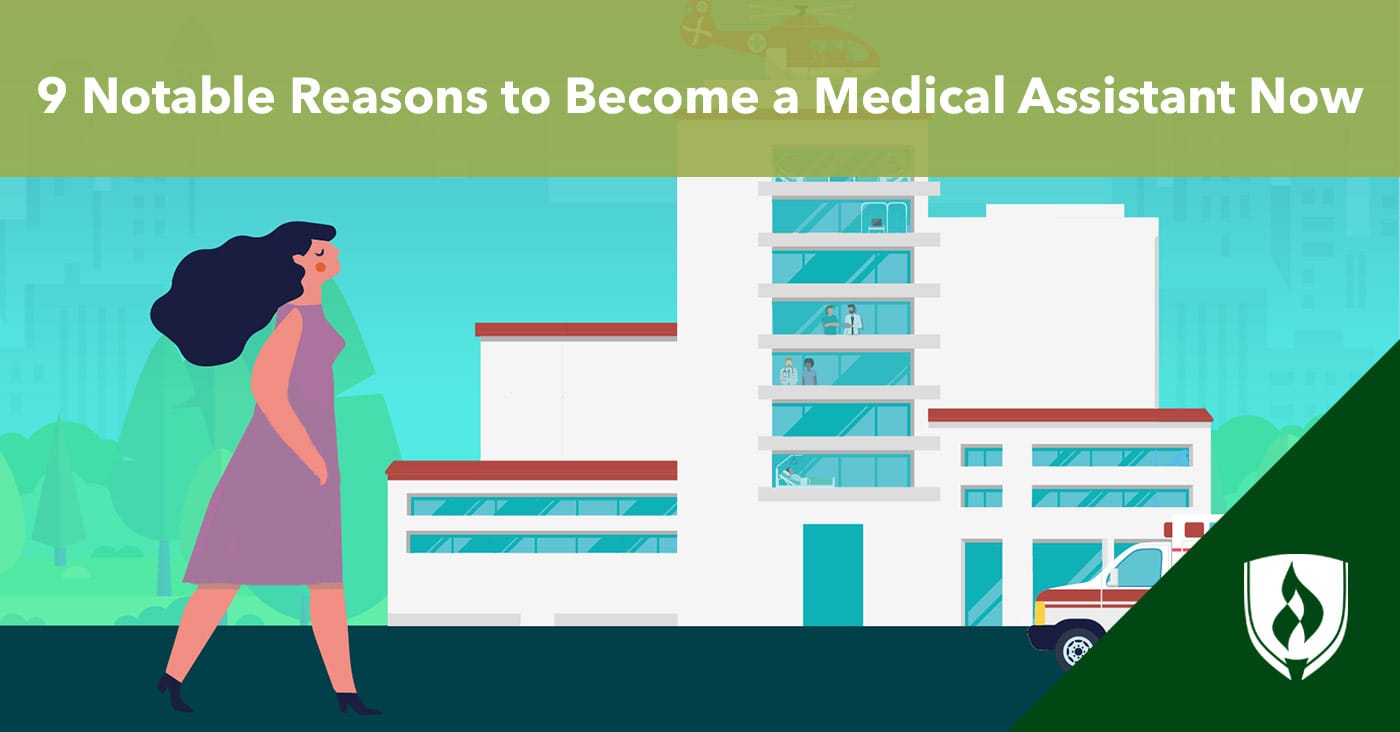
There’s a lot that goes into transitioning to a new career—especially when you have a family. The years and money that often get poured into earning a degree can seem burdensome in a number of ways. The best thing you can do for both yourself and for your family is to study up and make a careful decision, rather than jumping into something new without fully understanding what you’re getting yourself into.
Whether the idea of working in the medical field has been a long-time dream placed on the back burner or a newly-sparked interest, a medical assistant career can be a great place to get your start in the healthcare industry.
We know you don’t take this decision lightly, so we compiled this list of reasons why there’s no better time than now to become a medical assistant.
But first, what does a medical assistant do?
Before we get too far ahead of ourselves, let’s take a minute to understand the role and responsibilities of a medical assistant (MA). These professionals are first and foremost concerned with patient care, and this can be put into action in a number of different settings ranging from working in a large hospital to working in ambulatory care.
The ultimate goal of maintaining patient care can be translated in a variety of ways. MAs work under the direction of a supervising physician to perform necessary administrative and clinical tasks. Some of those administrative duties include updating patient records, scheduling appointments and handling various tasks in relation to patient billing and insurance.
Medical assistants also have their fair share of clinical responsibilities. This includes assisting the physician in taking and recording patients’ vital signs, explaining procedures, administering medications, drawing blood, sterilizing equipment and conducting a variety of tests in the lab.
9 Reasons to consider being a medical assistant
Now that you have a solid understanding of what the job entails, you’re still wondering: Is medical assisting a good career for you? Let’s take a look at some of the benefits of pursuing this profession.
Take a look at this short video for some of the more appealing advantages. We’ll go into even more detail below.
Become a Medical Assistant: 5 Reasons to Consider This Healthcare Career
1. Jobs are increasing faster than average
The healthcare industry as a whole is rapidly growing, and the same is true for medical assistants. MA jobs are projected to increase by 23 percent through 2028, according to the U.S. Bureau of Labor Statistics (BLS).1 This is more than four times faster than the national average of 5 percent.
This hasty growth can partially be accredited to the Baby Boomer population, who are now requiring more medical attention as they age. That direct medical care will be administered by physicians, but where there’s a physician, there tends to also be an MA providing a helping hand for all of those necessary medical procedures.
2. You can enter the field quickly
One of the biggest positives of medical assisting is that the job is accessible, especially when compared to some medical careers that can take years of college. The most straightforward path is earning a Medical Assisting Diploma, which can be completed in as few as 12 months in a traditional format or as few as 6-9 months in a subscription-based competency-based education format.2 Most Medical Assisting programs will incorporate a blend of classroom and laboratory work that include lessons in anatomy and medical terminology.
3. Certification can increase marketability
Most aspiring medical assistants choose to take the Certified Medical Assistant (CMA) exam. The test requires a broad and intensive understanding of healthcare implementation, and although studying for hours and hours probably doesn’t sound ideal, all of the information gleaned will prove incredibly useful once you land your first job.
Passing the exam earns participants the credential of CMA, as accredited by the American Association of Medical Assistants (AAMA). This credential isn’t required by all employers, but certainly has the potential to increase your marketability in the field.
4. You can work in a variety of different settings
Where there are physicians, there are also medical assistants who help them make things happen. You might be the type of person who enjoys variety, or you may just be concerned with finding the right fit for you within the profession. Well, don’t worry, because as an MA you’ll have plenty of options.
Medical assistants are actively working in a number of different healthcare venues: in hospitals, in clinics, in private practices and in ambulatory care. The BLS reports that in 2018, more than half of all MAs were employed in physician’s offices, or clinics.1 Other common settings included hospitals, offices of health practitioners and outpatient care centers.
5. Schedules are predictable
For many professionals in the healthcare industry, there is a requirement to work long, irregular hours. As a busy parent, you’d prefer not having to be on call in the middle of the night or during your child’s soccer game. You’ll be happy to hear that for the most part, MAs enjoy a fairly steady work schedule.
As mentioned above, most MAs work in medical clinics, which are typically only open during standard business hours. That means you will likely work a predictable work schedule, leaving plenty of time to enjoy much-needed time with the family.
If you do enjoy working the odd shifts, becoming a medical assistant at a hospital is an option you may consider pursuing. You’ll also have the option of working full-time or part-time hours, depending on your preferences.
6. The career is stable
Watching shows like Grey’s Anatomy or reading Facebook posts from friends who work as registered nurses has likely informed you that working in medicine is a non-stop job. There is a need for surgeons, nurses and medical assistants alike 24 hours a day, 365 days a year.
While professionals in some industries are unsure of their future in the field being replaced by technology, you can rest assured that there will always be a need for your abilities. As long as there are people with ailments and illnesses, there will be a need for medical assistants. Even the healthy patients undergoing routine checkups require the work of an MA.
7. You can work anywhere
The skills of a medical assistant are in demand in hospitals and clinics across the country. Considering a fresh start in a new state? Or maybe you have to move for your spouse’s job. Either way, you’ll have the opportunity to find a new position regardless of your location.
And if you do opt to earn your CMA accreditation, that credential will follow you wherever you go. The CMA credential is recognized across the country, meaning you won’t have to get re-certified to meet a different state’s requirements.
8. It can be a gateway to greater things
Becoming a medical assistant can be the perfect way for newcomers to begin their journeys into the medical field. It has more than enough potential to become a fulfilling, lifelong career in itself, but if your dreams span a bit further than that, this could be the first stepping stone of many.
A medical assisting position can be a great way to get your feet wet, determine how much you enjoy working with patients and potentially propel you to earn a nursing degree or work toward becoming an office manager in a medical setting. Building your skillset through medical assisting is a great place to start.
9. It is a fulfilling career
There is hardly a greater accomplishment for a caring people-person than to work in a field that strives to help people on a daily basis. Working face-to-face with patients and with their dedicated physicians can be both encouraging and inspiring.
What better way to teach your children about the importance of helping people than to dedicate your career to it? Working as an MA takes a lot of heart and dedication, and is likely to be a career in which you can take unending pride.
Are you ready to become a medical assistant?
We know that your family is your first priority, and for that reason, you want to be absolutely sure about your intended career before investing the time, money and effort of a degree program. The list above proves there are many perks to becoming a medical assistant. But the decision is ultimately yours.
If you’re convinced that a medical assistant career is the change you’ve been seeking, learn more about the education that will help prepare you in our article, “How Long Does It Take to Become a Medical Assistant? A Closer Look at the Training.”
Related Articles:
- Where Do Medical Assistants Work? 7 Settings Beyond the Clinic
- 6 Reasons Moms Already Have the Core Characteristics of a Medical Assistant
- 7 Signs You Would Thrive in a Medical Assisting Career
1Bureau of Labor Statistics, U.S. Department of Labor, Occupational Outlook Handbook, [career information accessed March, 2020]. Information represents national, averaged data for the occupations listed and include workers at all levels of education and experience. This data does not represent starting salaries. Employment conditions in your area may vary.
2Time to completion is dependent on number of accepted transfer credits and number of courses completed each term.
EDITOR’S NOTE: This article was originally published in September 2014. It has since been updated to include information relevant to 2020.




